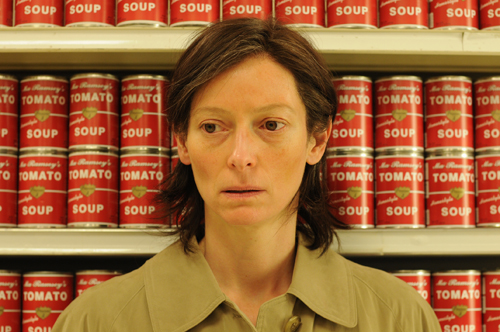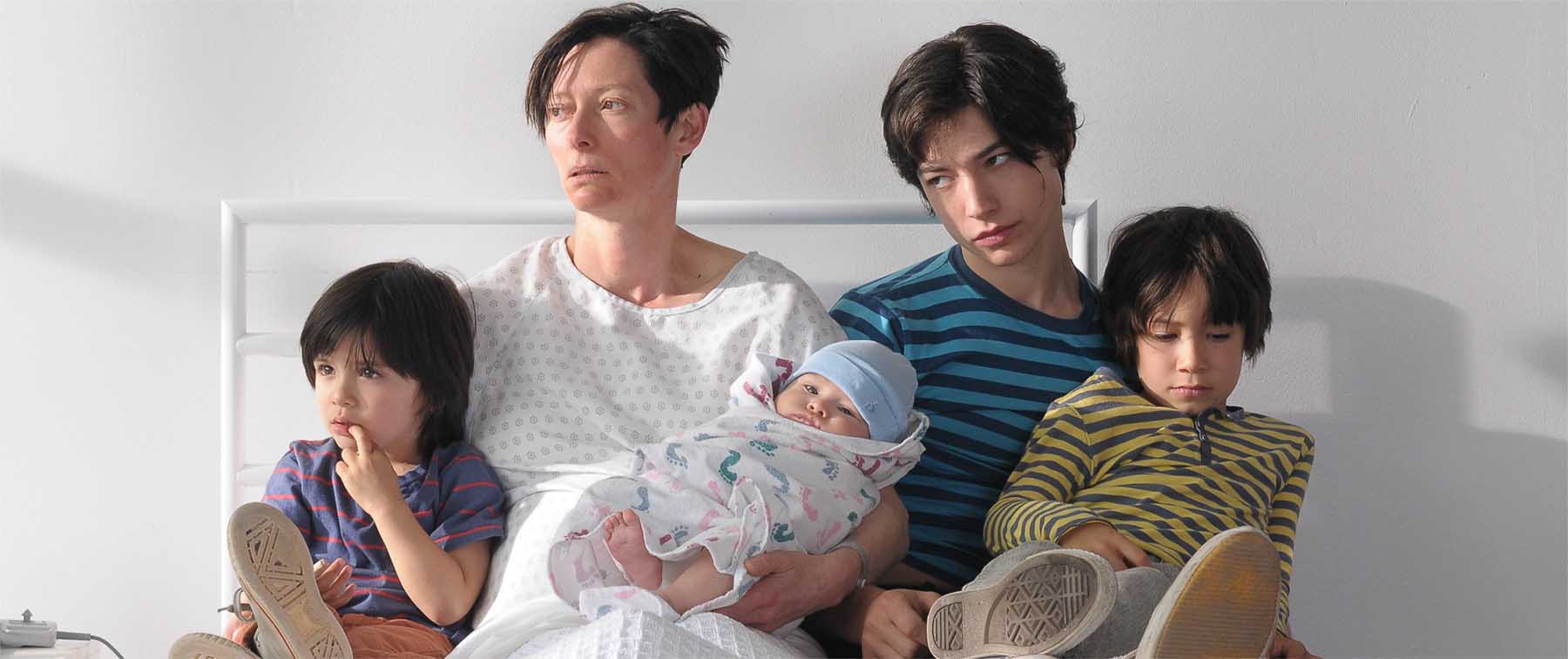OK, Lets Talk About We Need To Talk About Kevin…because wow, we really need to. First though, I have to say, there was nothing about this movie I liked. I didn’t like the cinematography. I hated the editing. I abhorred the screenplay and the story. Heck, I can’t think of one thing I did like about this movie. And yet, I have to give it high marks because that is exactly what this film wanted to do. This thing was actively trying to piss the viewers off. Like, in a premeditated, and calculatedly determined way…this movie took the viewer, realistically, into the world of the parents of a mass murderer. First, I can’t imagine what it would be like to experience the stress of being a parent of a mass murderer. Also, I can’t imagine what it would take to accurately communicate what this would be like via film. But I can imagine that whatever the results of an accurate portrayal would be, it’d probably come out looking a lot like this. So, yeah, I’m thinking that we are supposed to hate this film. We are supposed to hate the topic, screenplay, the cinematography. We are supposed to hate it all. That literally was the goal.
Let’s bang this walkthrough out – and get it flipping over with. Shall we?
We Need to Talk About Kevin Walkthrough
This movies juxtaposed back and forth between the pre-attack days, post-attack life makes this movie extremely complicated to piece back together again. So I’m going to try and walk it through somewhat chronologically.
From the day of Kevin’s birth, Eva, is not happy. Not even a little bit. No Hallmark moments of Kevin’s first breastfeeding – no post birth photographs. And Kevin just gets worse for Eva from there. The two won’t bond, he is incessantly crying. It’s as if Kevin has decided to make it his life mission to ruin his mother from the get go. He is determined. And he does so by refusing toilet training, etc., etc. Worse, when Kevin is with his father, he’s a cherub. So, obviously, Franklin is going to dismiss all of Eva’s concerns about her son’s descent into the lowest realms of Dante’s Inferno as Eva being overly emotional and myopic.
Now, there is one moment, when Kevin responds positively to his mother, and that is when she reads him a bedtime story about Robin Hood. And, afterwards, his father purchases him a bow and arrow, and teaches him how to use it. This is concerning to Eva, but she let’s it go. Then, when Eva and Franklin have a second child, Celia, she becomes the light and joy of the house. Kevin, obviously, is instantly jealous and hateful of the new arrival. We learn that, most likely, Kevin murders Celia’s hamster, and stuffs it in the garbage disposal. He also destroys one of Celia’s eyes with a cleaning product.
Which brings us to the murders. Kevin uses weapons grade bike locks to lock students in the gym, and then he proceeds to systematically murder them with his bow. Worse, Eva, arriving home from the chaos, discovers that Kevin has killed both Celia and his father Franklin. Eva visits Kevin on the second anniversary of the murders, and asks him why he did it. Kevin tells her that while he once thought he knew why, now he doesn’t. And with that, his mother hugs his son. And, as his mother tries to go about living her life, in spite of the heinous horrors that her son has committed, she finds it utterly impossible to remember anything but blood. It’s there in her happiest memories of the tomato festivities in Italy. It’s there in the grocery store aisle. It’s splashed across the front of her house in red paint. Blood is everywhere – it’s omniscient. It’s pre-attack, it’s mid-attack, is post attack. There is never no blood anymore in the memories and daily experiences of Eva’s life. And there will never not be blood seeping through the cracks of her falling apart life.
But Here’s the Thing
When Columbine happened, I sat in my car, with a friend, and listened to the police scanner of the reports coming out of the school less than 40 miles away. It was a protracted, and evil, horrible day. Now though? It’s just one of many stains on this country’s conscience. I remember sitting there, first thinking about the people trapped inside the school, then thinking about the perpetrators, who they could possibly be. And then my thoughts went to the parents of whoever it might be that was doing this. We naturally jump to them. Because we want to know why. And when the two killers committed suicide, and we didn’t have a clear answer, we have nowhere else to go but to the parents to give us insights into their failings and their obvious moral lapses that caused this horrific tragedy.
It’s in this light that as we watch this film, we are torn. On the one hand, we can’t but think anything but compassionately for Eva. I mean, her life is a horror show. I couldn’t handle the chaos of her experiences with the diaper years, let alone the actual school murders. But we also hold another equally opposite duality in our minds simultaneously. And that is hatred. I mean, what else is there to feel? These school children where stalked, hunted, cornered, and mercilessly slaughtered. Did his parents beat him? Did the father chain Kevin to a radiator and deprive him of food? Was the father missing entirely? (Study’s show, most school murderers actually have a father, but he’s absent emotionally.) That’s because we jump straight to blame. And boy, does Eva take way more than her fair share of blame.
Which is what is so interesting about this movie. We watch, in a back and forth whipsawing fashion, from tragedy, to infancy. From bow and arrow, to eye patches and hamsters in the kitchen sink. Did I mention that this movie is infused with blood? And when Lynne Ramsay asked permission to use Campbell Soup cans, they were denied. When they asked to use Coke, they were denied. Why? Because no one wanted to be associated with this project. Which basically makes this film an almost alternate reality of pain and discomfort.

If you flip through the book – read it – react to it, you realize just how hard this movie had to have been to make. Why? Because Eva is a mental train wreck after mental train wreck of unacceptable thinking. I mean, she is welcome to be anyone she wants to be, this is America after all. But Mary, Moses, and Joseph is she a mess. She came across to me as possibly the single most unsympathetic character in all of history. She literally shouldn’t have mothered anyone. Let alone Kevin. She literally was confused why anyone would ever have children in this present age, when, they weren’t necessary for help with farming. In this technologically advanced world – she was confused as to why she was having children for heaven’s sake. The worst part though wasn’t her hatred, or negative reaction to mothering, but rather her ambivalence towards it.
The question I left with, after watching the film, was what just happened? Who was really to blame? How could this possibly happen? It just sort of seemed like a massive cosmic disconnect between mother and son. But, after reading at the book, I learned that it was anything but. Interestingly enough though, if you replay the events specifically from the lens of the book, you quickly realize that Eva is the prime mover here. She is the focal point of the blame for her son’s horrific crimes. She isn’t an accidental bystander with the unlucky fortune of having a child without a soul. There were no demons that interceded here. No poltergeists. Kevin was a result of Eva’s emptiness, her elusive pragmatism.
We Need to Talk About Kevin looks past Kevin. It places him over there, on the shelf, and it focuses its gaze…sternly, on the mother. It’s as if this project is a cautionary tale to all hopeful parents in the world. “Look” this movie says, “realize this, if you are planning on having a child – it is one, big, enormously critical, undertaking that you are planning on starting.” It’s as if the movie is screaming that the person responsible for sniping these children full of arrows isn’t Kevin at all – but rather that it was Eva. It was her insensitivity that was directly responsible for these murders. It was her unconscionable treatment of her son that placed these high schoolers in harm’s way. It wasn’t a question. It was an answer.
This disparity wasn’t Tilda Swinton’s fault. In the book, her true feelings and emotional wastelandness, were spelled out in letters to Franklin. But in the movie, that device was dropped, and we, instead, were left with Swinton’s chiseled gaze, and black-hole-sized vapid despair. But given the complexity of the material to work with, it seems as though Swinton should have at the very least been nominated for an Oscar (OK, so she was nominated for a BAFTA for this role. Thank goodness there was that). Because this was ridiculously difficult material to flesh out. I mean, a mass murderer movie about the mother? Holy crap.
Yeah, I really hated this movie…like a lot. But it’s the best movie I’ve have ever had the privilege of hating.
Edited by: CY


